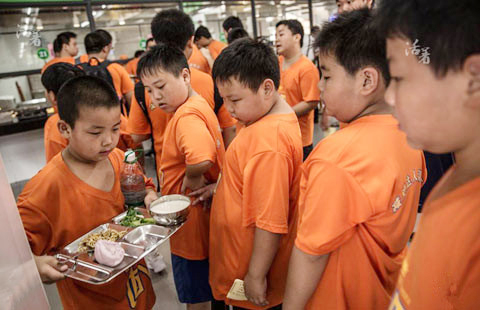Microsoft tries again with chat robot Xiaobing
Updated: 2014-09-16 11:13
By Wang Ru in Beijing(China Daily USA)
|
||||||||
Microsoft's artificial intelligence (AI) chat robots in China - Cortana and her little sister Xiaobing - are not only out to entertain the country's 600 million Internet users with their hip, slang-laden comebacks, reminders and tips, but they also aim to explore the huge mobile and smart home market.
After being banned by China's most popular mobile messaging platform WeChat in June over privacy and security concerns, Xiaobing, Microsoft's first Siri-like chat robot in China, will be available once again, in second-generation form, on WeChat, which is owned by Tencent Holdings Ltd, China's largest Internet company.
"We are working with Tencent to make Xiaobing's return happen soon," said Li Di, senior product manager of Microsoft's Beijing-based SearchTechnologyCenterAsia(STC).
"We will work with online shopping giant Jingdong on entering the emerging smart home market," said Li Di.
In August, a video clip released by the project team showed someone switching a light on and off via Xiaobing's voice-control function.
According to a report from UK-based Juniper Research, by 2018, the total market revenue of smart home and appliance technology will reach $71 billion, with 32 percent of it the Chinese market.
With a purported intelligence equivalent to a 16-year-old human's, Xiaobing was launched in late May and now has 950,000 followers on Sina Weibo, China's equivalent of Twitter.
It has 500 million interactive dialogues throughout all Internet platforms in China and hit a record of 120 million dialogues on Weibo within 72 hours.
After being released on WeChat in June, Xiaobing was added by 1.5 million chat groups on WeChat, 10 percent of its total number.
"Compared to other products of its kind, Microsoft's Xiaobing is the only smart software that can communicate continuously with a human," said Li. "The scenario of the recent Hollywood sci-fi movie Her will be realistic in the future with this technology."
The so-called smart mate - which in addition to offering witty chat based on 15 million phrases from dialogues generated by Chinese netizens, gives weather reports and food advice - was blocked by WeChat three days after its launch. Parent company Tencent was reportedly concerned over spam accounts and privacy issues raised by the new comer.
"Xiaobing's replies are from Microsoft's search engine Bing (Xiaobing means Little Bing)," said Li. "The dialogues and private information are wiped off immediately by Xiaobing without any recording."
Compared to its performance in the US market, which has reduced market gap against Google, Microsoft's web search engine Bing performed poorly with a market share under 1 percent.
Analysts pointed out that Bing could only walk out of the dilemma in China through exploring the mobile and smart search market.
In an interview earlier this month, Lu Qi, Microsoft's executive vice-president, said the combination of mobile and smart search with big data will provide much more accurate and useful information in the future.
Satya Nadella, Microsoft's new CEO, wrote in a letter to company employees that cloud computing and big data and intelligence from machine learning were the future of the "software-powered world".
Xiaobing and her older sister Cortana are seen as Microsoft's key move to seize the potential AI market by challenging Apple's Siri and Google Now.
"Cortana and XiaoBing may integrate or play different roles," Li said. "For example, Xiaobing focuses on lifestyle and entertainment, while Cortana operates in working and learning."
Named after a female AI role in Halo, a sci-fi war game on Microsoft's XBOX gaming console, Cortana will be available on Windows and XBOX soon. It has been applied to several popular mobile travel and flight applications in China.
wangru@chinadaily.com.cn
(China Daily USA 09/16/2014 page2)
Most Viewed
Editor's Picks

|

|

|

|

|

|
Today's Top News
Sinopec privatization biggest in Xi's tenure
Beijing to tighten foreign hiring requirements
More CFAs buoy hopes for finance
Hillary Clinton takes a big step toward 2016
US teachers visit China on fellowship
Silk Road, climate change on agenda
Boosting innovation in Latin America
China, LatAm see rosy trade prospect
US Weekly

|

|















